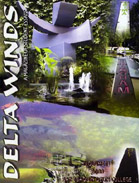The True Purpose of College and Higher Education
 Delta Winds: A Magazine of Student Essays
Delta Winds: A Magazine of Student Essays
A Publication of San Joaquin Delta College
2000
The True Purpose of College and Higher Education
Dung Nguyen
When academics created various educational systems long ago in ancient Greece and China, they did not design these centers of learning for the masses. Rather, they were made for the elite: the well-endowed, prosperous citizen. These places were conceived with the ideas of wisdom and enlightenment in mind. Unfortunately, (or fortunately, depending on one's opinion) this is no longer the case in many educational facilities. In the United States, university and college systems have become much more accessible to the populace. Though there is little doubt that this is a good turn of events, it has also brought about a change in the focus of many institutions. Universities seek to attract accomplished researchers from around the world, putting less and less emphasis on dynamic curriculum and "credential" teachers. Instead of making education a diverse and interactive environment where one challenges known assumptions, and probes mysterious realms of thought, it has become one where the same topics are taught repetitively every year, making students cynical and unconcerned about real learning. Rather, students care much more about getting an "A" and graduating with their degree on time. The romantic notion of learning for the sake of increasing one's understanding is no longer practiced. This is mainly due to the mass production methods now being applied to higher learning.
There are a number of factors affecting the way university systems are operated. These include raising tuition costs and continually increasing expectations upon students. These two factors, along with the greatly increased number of people attending universities, have caused depreciation in the value of an education and, more importantly, degradation in the emphasis most institutions place on creative, dynamic learning processes. Raising tuition has had the adverse effect of forcing students to rush through their college years, without taking full advantage of all the diverse resources and experiences lying before them. Financial pressures make it nearly impossible for students to explore classes that would not fulfill their degree requirements. Beyond completing the basic general education requirements, students rarely take classes to simply broaden their horizons. Chemistry majors do not take art or music classes for fun. Philosophy majors don't try physics and mathematics courses for the sole purpose of gaining knowledge. This is a sad statement, but a reality that has come about due to rising costs of education.
Higher expectations and a push for timely graduation have also made students less concerned about the value of the education they are receiving, and more worried if their transcript will look good. These higher expectations and a stress on practicality prevent learning for the sake of learning. If one attempts to be broad and take additional courses, one is often seen as strange and even looked on with scorn for not finishing their schooling "on time." With so many higher expectations, grades become predominant over self-improvement via personal questing and individual study. Why read if it is not required? Why learn if it is not for a class? Understanding becomes contingent upon an institution that does not encourage going beyond the required courses planned out ahead of time. Though some enthusiastic students do find the time and willingness to pursue diverse and budding interests, most simply lack any desire to expand their minds for personal enlightenment and growth. Most desire to pursue an active social life instead.
The effect of needing to provide higher education for the masses has also diluted the emphasis on learning from being an interactive, diversifying experience to one of an assembly-line process where everyone endures the same classes and does the same monotonous tasks. There is little diversity of experience and no challenge to answer the deep questions fundamental to what people are learning. Universities can not focus on the individual simply because there are too many people to deal with. If people want to be able to answer the deeper questions about their education, they must do so on their own, outside the classroom. Most professors are content to simply teach the required curriculum, leaving out contextual questions that force the mind to question, since they would likely confuse many students.
The difficulties of mass education impose certain restrictions upon the depth and dynamic nature of university-level curricula. Even though some humanities courses offer more in the way of independent probing and pondering of fundamental issues, they still can not compare to the fluid, evolving style of learning that occurred long ago when there was no set educational structure. In this modern-age, we prefer a more well defined, structured lifestyle, which includes our educational system. For organizational purposes, this is quite necessary in education, in order to fairly treat such a large number of students.
The modern-day educational system, which is more practical and structured, and less centered on personal understanding, is a product of the needs of a mass educated society. Rising tuition costs and higher expectations with shorter graduation times contribute to the feeling that deeper understanding is secondary to the grades received. Students rush through their college years without taking the time to explore avenues of thought that could broaden their perspectives. Practicality, not idyllic learning, is stressed due to the views of society and the numbers of people entering university-level education. Of all causes for the lack of concern for a deeper, more probing learning environment, the goal of a uniformly educated society has to be the most determining factor. To educate people on a large-scale, the education community sacrifices some of what made education so powerful, by shifting the focus from true understanding to academic achievement.






